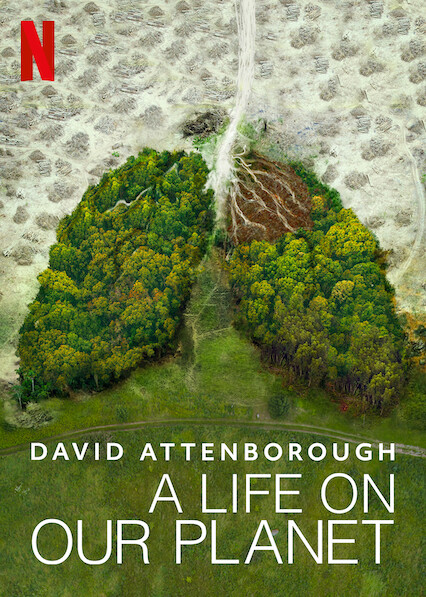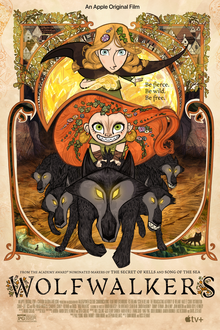Eco-cinema or, more generally, fiction and non-fiction films with environmental or ecological themes and rhetoric are among the most well-studied Green Media phenomena. Below, we briefly summarize a few recent representative cases from our mediography.
Okja (2017)
 What if we could meet the challenges of the ongoing environmental crisis without changing our behaviour and practices in any way? What if, rather than revising our way of life, we could instead propose a few technical fixes that would reduce our environmental impacts while allowing us to go on living as before? Would this really settle the ethical and political questions that are posed by our current moment of climate catastrophe, mass extinction, resource scarcity and industrialised animal slaughter? These are some of the questions that are posed by Netflix’s original movie, Okja. The story centres on the eponymous Okja, an animal belonging to a new species that has been genetically engineered to fulfil the developed world’s boundless appetite for meat, while minimising the environmental impact of its production.
What if we could meet the challenges of the ongoing environmental crisis without changing our behaviour and practices in any way? What if, rather than revising our way of life, we could instead propose a few technical fixes that would reduce our environmental impacts while allowing us to go on living as before? Would this really settle the ethical and political questions that are posed by our current moment of climate catastrophe, mass extinction, resource scarcity and industrialised animal slaughter? These are some of the questions that are posed by Netflix’s original movie, Okja. The story centres on the eponymous Okja, an animal belonging to a new species that has been genetically engineered to fulfil the developed world’s boundless appetite for meat, while minimising the environmental impact of its production.
David Attenborough: A Life on Our Planet (2020)
 This documentary serves as the “witness statement” of 94-year-old naturalist David Attenborough, who traces his career as a natural historian and outlines how the biodiversity of our planet has degenerated over his lifetime. The narrative starts in Pripyat, the ghost city home to the former Chernobyl Nuclear Plant, and traverses across various locations including the African Serengeti. He laments over a drastic decline in wildlife, caused by humans. Looking back at his career that spans five decades, Attenborough ultimately articulates hopes for the future and brings to the forefront solutions that may restore biodiversity.
This documentary serves as the “witness statement” of 94-year-old naturalist David Attenborough, who traces his career as a natural historian and outlines how the biodiversity of our planet has degenerated over his lifetime. The narrative starts in Pripyat, the ghost city home to the former Chernobyl Nuclear Plant, and traverses across various locations including the African Serengeti. He laments over a drastic decline in wildlife, caused by humans. Looking back at his career that spans five decades, Attenborough ultimately articulates hopes for the future and brings to the forefront solutions that may restore biodiversity.
Wolfwalkers (2020)
 Story-wise, the film follows a young wannabe hunter by the name of Robyn Goodfellowe (voiced by Honor Kneafsey). In a tale set centuries ago, she moves to Ireland with her father Bill (Sean Bean) when he’s hired to eradicate the last wolf pack lurking in the woods. The locals, as overseen by an English Lord Protector (Simon McBurney), want to wipe out the wolves so that they can tear down the forest in the name of progress. But, after sneaking out to go exploring, Robyn befriends a girl called Mebh (Eva Whittaker) who just might be a member of a mythical tribe that’s able to shapeshift into wolves while they’re dreaming. As well as a rousing eco-conscious narrative, Wolfwalkers serves up distinctive, eye-catching animation — as its first teaser trailer makes plain. Expect earthy, natural colours, with greens, browns, oranges and yellows dancing across the screen. The film features a line-heavy animation style, too, which is almost reminiscent of woodblock prints.
Story-wise, the film follows a young wannabe hunter by the name of Robyn Goodfellowe (voiced by Honor Kneafsey). In a tale set centuries ago, she moves to Ireland with her father Bill (Sean Bean) when he’s hired to eradicate the last wolf pack lurking in the woods. The locals, as overseen by an English Lord Protector (Simon McBurney), want to wipe out the wolves so that they can tear down the forest in the name of progress. But, after sneaking out to go exploring, Robyn befriends a girl called Mebh (Eva Whittaker) who just might be a member of a mythical tribe that’s able to shapeshift into wolves while they’re dreaming. As well as a rousing eco-conscious narrative, Wolfwalkers serves up distinctive, eye-catching animation — as its first teaser trailer makes plain. Expect earthy, natural colours, with greens, browns, oranges and yellows dancing across the screen. The film features a line-heavy animation style, too, which is almost reminiscent of woodblock prints.
2040 (2019)
 Rather than focusing on the urgency of problems, this solution-oriented documentary seeks out creative alternatives to tackle challenges of climate change. In particular, it imagines technological breakthroughs which, supported by academics and ecological experts, have the potential to reverse the situation by the year 2040. The film follows Damon Gameau’s imagining of a future for his four-year old daughter Velvet, where climate change has been solved. Described as “an exercise in fact-based dreaming” the film is structured as a letter to his daughter whereby Gameau travels around the world investigating numerous solutions that can contribute towards climate mitigation and imagining what a future would be like where they have been implemented at scale. In choosing what to feature in the film, Gameau restricted it to solutions that are either already available or have a realistic potential to greatly contribute to reversing climate change by the year 2040. The film features interviews with numerous academics, ecological experts and entrepreneurs and covers five broad areas; it examines how renewable energy, like rooftop solar, have enabled micro-grids to form in Bangladesh enabling communities to produce, own and trade their own energy.
Rather than focusing on the urgency of problems, this solution-oriented documentary seeks out creative alternatives to tackle challenges of climate change. In particular, it imagines technological breakthroughs which, supported by academics and ecological experts, have the potential to reverse the situation by the year 2040. The film follows Damon Gameau’s imagining of a future for his four-year old daughter Velvet, where climate change has been solved. Described as “an exercise in fact-based dreaming” the film is structured as a letter to his daughter whereby Gameau travels around the world investigating numerous solutions that can contribute towards climate mitigation and imagining what a future would be like where they have been implemented at scale. In choosing what to feature in the film, Gameau restricted it to solutions that are either already available or have a realistic potential to greatly contribute to reversing climate change by the year 2040. The film features interviews with numerous academics, ecological experts and entrepreneurs and covers five broad areas; it examines how renewable energy, like rooftop solar, have enabled micro-grids to form in Bangladesh enabling communities to produce, own and trade their own energy.

